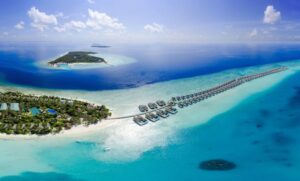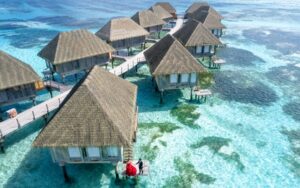The Maldives, long recognized as a high-end tourism destination, will introduce its first formal residency-by-investment program.
Announced in early July 2025, the Maldives investor visa is part of President Mohamed Muizzu’s Vision 2040 agenda, which seeks to reduce reliance on tourism and attract foreign capital into the economy.
Unlike the earlier Corporate Resident Visa—built around business investments and deposits—the new investor visa targets high-net-worth individuals willing to inject capital into government-approved luxury real estate and resort projects.
The program is structured to compete with similar golden visa schemes worldwide, but with a narrower focus on exclusivity and long-term economic diversification.
However, as of writing, there are still no confirmed timeline or implementation of the program.
This article discusses the details of this new initiative, such as the process, eligibility requirements, and government-approved real estate projects to invest in.
My contact details are hello@adamfayed.com and WhatsApp +44-7393-450-837 if you have any questions.
The information in this article is for general guidance only. It does not constitute financial, legal, or tax advice, and is not a recommendation or solicitation to invest. Some facts may have changed since the time of writing.

What is the Maldives Investor Visa Program?
The Maldives investor visa is proposed to be a residency-by-investment scheme that grants eligible foreign nationals a five-year, renewable residence permit in exchange for qualifying investments.
Applicants can include their spouse, dependent children, and parents under the same application.
Key features of the program include:
- Investment-linked residency: Minimum capital outlay of USD 250,000 into approved real estate.
- Residency flexibility: Holders are not required to live in the Maldives to maintain the visa.
- Due diligence requirements: Applicants must undergo background checks, provide police clearance, and submit medical documentation before approval.
The visa is intended as a high-value, low-volume residency option, positioned less as a path to mass migration and more as a controlled mechanism to draw strategic investment into Maldivian property and infrastructure.
Minimum Investment for Maldives Investor Visa
To qualify for the Maldives investor visa, applicants must commit at least USD 250,000 into government-approved real estate projects.
These are primarily luxury residential and resort developments authorized under the program. Higher-value projects can require substantially more capital, USD 5 million or more, particularly in premium resort islands.
Investors are not expected to take on management or operational roles; the qualifying criterion is ownership of the approved asset.
The government has framed this threshold to attract high-net-worth individuals, not broad investor migration. This contrasts with programs in other countries that target mid-range investors with diversified entry levels.
Maldives Real Estate Investment
The Maldives investor visa is tied to government-approved luxury real estate rather than open property markets. At present, the most concrete example is the Gaafaru Integrated Tourism Development Project in Kaafu Atoll.
Managed by the state-owned Maldives Fund Management Corporation, the project includes the reclamation of 16 artificial islands, 14 designated as ultra-luxury private islands for residential sale and two for high-end resorts.
The masterplan, designed by Foster + Partners, positions Gaafaru as the flagship pipeline for visa-eligible real estate.
A second major initiative is the Ras Malé/Fushi Dhiggaru Lagoon development, a large-scale reclamation program intended to deliver more than 65,000 housing units in a climate-resilient eco-city near Malé.
While the government has not yet released specific parcels for foreign purchase, industry reports indicate that parts of this project are expected to be opened as visa-qualifying residential zones.
In addition, the tourism cross-subsidy framework allows investors who fund designated public projects to secure rights to resort and residential developments elsewhere in the country.
Some of these packages include private accommodation enclaves that may become visa-eligible once formally accredited.
Foreign ownership in the Maldives is structured through long-term leaseholds, typically up to 99 years, rather than freehold.
For this reason, investors are advised to confirm that any property is explicitly listed on the government’s pre-approved project register, which will be the decisive factor in visa eligibility.
Who is eligible to apply for an investor visa in the Maldives?
The program will be open to foreign nationals who can demonstrate financial capacity and meet basic suitability standards. Applicants must:
- Pass due diligence screening, including background and financial checks.
- Provide police clearance certificates verifying a clean criminal record.
- Submit medical documentation to confirm good health.
- Demonstrate the ability to fund the required investment from legitimate sources.
There are no nationality restrictions, but unlike citizenship applications, the program does not impose religious requirements.
The government has emphasized that the scheme is tailored for responsible investors with verified backgrounds, reflecting international standards for residency-by-investment programs.
Can I include my spouse and children in my investor visa application?
The Maldives investor visa extends residency benefits to the applicant’s immediate family. Eligible dependents include:
- Spouse
- Dependent children
- Parents
All family members are granted residence permits under the same five-year renewable framework as the principal applicant.
This feature makes the program competitive with other global residency-by-investment schemes, which often limit dependents to spouses and children only. By allowing parents, the Maldives provides broader family coverage than most comparable programs.
Application Process: How to Apply for a Maldives Investor Visa
The application to the investor visa in Maldives follows a multi-step procedure designed to ensure regulatory compliance and investment integrity:
- Select an approved investment project – Applicants must choose from government-authorized real estate or resort developments.
- Commit the investment – Proof of funds and transaction details must be provided.
- Prepare documentation – Required materials include:
- Valid passport
- Police clearance certificate
- Medical clearance forms
- Evidence of investment funding source
- Submit the application – Filed with Maldivian authorities or through accredited intermediaries.
- Due diligence review – Background checks conducted on all applicants and dependents.
- Government decision – If approved, residence permits are issued for five years, with the option to renew.
Processing times have not been formally standardized, but industry guidance suggests the review period is expected to be several months, given the due diligence requirements.
Is physical presence in the Maldives required to maintain the visa?
No. One of the most distinctive aspects of the proposed Maldives investor visa is that physical residence in the country is not required to maintain status.

Holders can keep their five-year permit active without relocating full-time or spending a minimum number of days per year in the Maldives.
This makes the program attractive for investors who want the benefits of residency, such as multi-entry access and family inclusion, without the obligation to base themselves permanently on the islands.
The visa is issued for five years at a time and can be renewed indefinitely, provided the qualifying investment is maintained and all program conditions continue to be met.
Renewal requires updated documentation, including proof of investment ownership, valid passports, and, in some cases, refreshed police and medical clearances.
This framework aligns the Maldives with other low-residency-obligation programs (such as those in the Caribbean), but it differs from immigration-driven models like Portugal’s Golden Visa, which historically required minimum stays to qualify for long-term rights.
Can Maldives investor visa lead to citizenship?
No. The investor visa does not provide a pathway to Maldivian citizenship. The country’s constitution restricts naturalization: only Muslims are eligible to apply, and applicants must demonstrate 12 or more years of continuous residence before being considered.
Even then, naturalization requires meeting cultural and linguistic integration tests, along with parliamentary approval.
For most foreign investors, this means residency status will remain the ceiling. Unlike golden visa programs in Europe or the Caribbean that explicitly link investment to eventual citizenship, the Maldives program is intentionally limited to residency rights only.
The government’s stated aim is to secure capital inflows while avoiding the demographic and political implications of granting foreign nationals a direct route to citizenship.
In practice, the program functions more like a long-term residence permit tied to real estate ownership than an immigration strategy.
Investors gain the ability to reside, bring family, and benefit from the Maldives’ tax-neutral environment, but citizenship remains off the table for non-Muslims and is prohibitively difficult even for Muslim investors.
Is the Maldives a Good Place for Expats?
While the Maldives investor visa creates a clear legal route to residency, the country itself is not positioned as a conventional expat hub.
The islands are geographically dispersed, with a population under half a million, and most infrastructure is concentrated in Malé, the capital.
Outside of the resort sector, options for healthcare, education, and business services are limited compared with larger expatriate destinations.
For high-net-worth individuals, however, the program is less about relocation and more about access to a luxury second home.
The Maldives offers a politically stable environment, tax neutrality (no personal income tax, capital gains tax, or inheritance tax), and a lifestyle centered on exclusive island resorts.
This makes it attractive for investors who already maintain global mobility and simply want a secure, tropical residence option.
Expats seeking long-term integration will face challenges: limited housing outside resort developments, small-scale infrastructure, and restricted citizenship access.
In practice, the Maldives residency program is best suited for wealthy individuals and families looking for a vacation base, an asset diversification play, or a status symbol, rather than those planning to settle permanently.
For more thorough guidance, it is recommended to seek the assistance of an expat financial advisor or immigration expert.
Pained by financial indecision?

Adam is an internationally recognised author on financial matters with over 830million answer views on Quora, a widely sold book on Amazon, and a contributor on Forbes.



